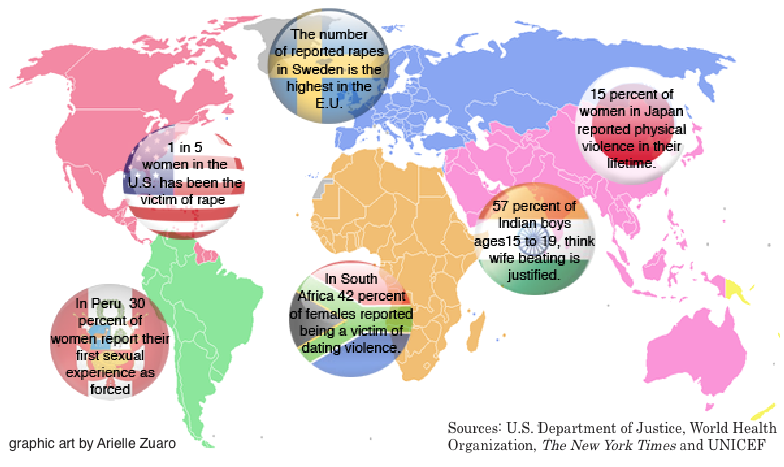by MaryEllen Cagnassola
In Steubenville, Ohio, a 16-year-old high school girl is drugged and raped. In New Delhi, India, a young woman is brutally attacked on a bus and later dies from her injuries. On a college campus in Arizona, a student stands in a common area, carrying a sign that reads, “You deserve rape.”

These incidents of gender violence and misogyny are a universal phenomenon, according to the United Nations research on violence against women, though little statistical information can be obtained on an international level. Why? Because in many nations, violence against women is common and accepted, making it nearly impossible to collect accurate data regarding these atrocities.
The prevalence of violence against women, one of the world’s most common human rights abuses, is nothing short of an outrage. The male-dominated cultures in Africa, the Middle East, Asia, and Latin America perpetuate this senseless abuse; in fact, wife beating, rape and verbal abuse against women are considered a normal part of these patriarchal societies.
The World Health Organization (WHO) found that more than 60 percent of all murder cases in Zimbabwe that go through the high court can be attributed to domestic violence. Even more disturbing and heartbreaking, WHO reports that 16 percent of patients treated for sexually transmitted diseases in Zaria, Nigeria are younger than five. In battle-weary areas of Africa, specifically the Democratic Republic of the Congo, rape of women and girls is merely another weapon of war.
In terms of changing the culture of nations where human trafficking, wife beating and rape are so ingrained, there is not much that can be done except, as Pulitzer Prize-winning columnist Nicholas Kristof said in a TED interview, to find reassurance in the altruism and selfless acts of humanity individual people perform in the dark places of the world.
As Americans, we are not immune to this savagery. WHO reports that every two minutes in the United States, a woman is sexually assaulted; on average, there are 207,754 reported victims of rape or sexual assualt each year.
Stories such as the gang rape of a comatose teenager in Steubenville have grabbed headlines, and although national rates of violence against women have declined by 60 percent since 1995, according to the Bureau of Justice statistics, there is still much progress to be made in terms of aiding those women whose lives have been touched by brutality.
“Transgender women face extremely high rates rates of violence and are frequently turned away when they ask for help from the police,” said senior Lindsay Reed. “The government needs to do more to assist victims.”
For more than a year, partisan conflicts in Congress prevented the reauthorization of the Violence Against Women Act (VAWA), which seeks to address gender-based violence by providing funding for programs such as victim-assistance services, legal aid for victims and community violence-prevention programs.
Though it was supported by large bipartisan majorities only eight years ago, House Republicans failed to come to an agreement on VAWA because they opposed added protections for immigrant women, American Indians and the lesbian, gay, bisexual and transgendered community.
“The VAWA addresses gender violence and helps develop specific services for different communities that may face violence in different ways as a result of racism, classism, transphobia, homophobia, or ableism,” said Reed. “It is distressing that anyone would refuse to pass an act that could help protect someone from violence.”
The act was renewed on Feb. 28, when just over half of the House Republicans agreed to the act’s revision.
Clearly, the inadequate protection and aid for American women, along with the stalling of this integral piece of legislation, outweighs any decline in overall violence since the act was passed in 1994.
“Political opposition and partisan conflicts are getting in the way of simple legislation that should be passed without hesitation,” said junior Angelo Chaia.
The United States government, along with perpetrators of crimes against women, must change their attitudes on rape, domestic violence and abuse. Only then can we begin working toward a world where women are, as they should be, safe and protected.
World attitudes perpetuate violence against women
May 20, 2013
0
More to Discover

